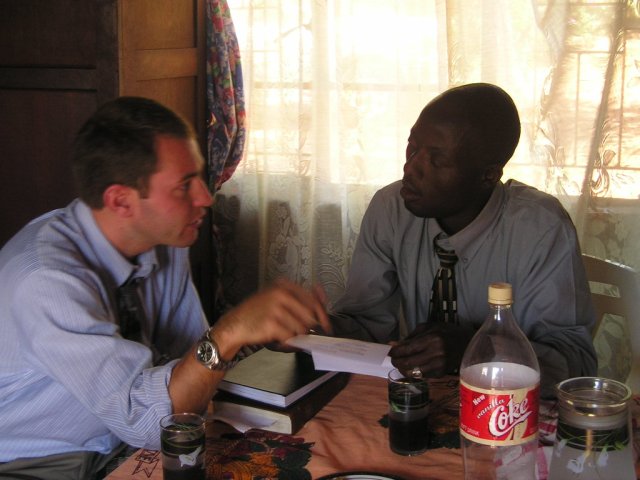This really should go "without saying"; but unfortunately, some missionaries rely on translators for years, making little attempt to apply themselves to the language of the people around them. I have little to say in return to such a missionary. There are so many reasons why it is important for a missionary not only to get by in the language of his people, but also to be a linguist--to study the language in an attempt at eventual fluency. (This job never really ends.)
Why should missionaries be linguists?
Well, probably most obviously, attempting to learn the language communicates love--and humility. When people see a "smart" person (and some Africans think you are smart simply because you do speak English) humbling himself by stuttering out concepts in their home language, it makes you a real, accessible person. So many Africans have been delightedly surprised to hear us greet them in their language. And for some, their delight is unbounded when they hear us converse with them even beyond the greetings. Our first male convert came about because Seth stuck out his hand to shake hands with a security guard at a grocery store and greeted him in Tsonga, "Mi njhani?"
Next, learning the language forestalls errors in translation or miscommunication. Take out the middle man, the translator; and although yes, there are certain concepts the translator will be able to say better than you, once you have learned the language, you may find that there are certain concepts the translator himself didn't understand the way you meant them; and you may be chagrined to find out how he was translating it.
But finally and most importantly, there is a vital connection between language and culture. Learning the two go together. There is a debate about which came first--the chicken or the egg? Or in this case, the culture or the language? When you learn the language, you are gleaning eye-opening information about how those people think. What is important to them, and what isn't? In this case, words that they do not have may communicate just as much as the ones they do have.
Here's how an expert says it:
Ethnolinguistics, the study of the relationship between language and culture, has shown that languages provide categories through which people think. Languages mirror culture at every point. They emphasize and systematize what is important to the culture and filter out what is not important. For example, Eskimo tribes have as many as seven distinct labels to distinguish between types of snow ("falling snow, snow on the ground, fluffy snow, wet snow, and so forth"), while English has one all-inclusive word for the concept. Equatorial African languages have no term at all for snow but typically expand the word hail to include the idea of snow....
As missionaries evangelize in animistic contexts, they must realize that as outsiders to the cultures they must learn the categories of animistic thought as formulated by cultural insiders....These categories must be understood by the missionary if he is to effectively communicate God's eternal message in contexts where animistic worldviews are present. pg. 45-46, 48 Communicating Christ in Animistic Contexts by Gailyn Van RheenenThe Tsonga language is much less complex and much more limited, especially in words for propositions, than English. We are stymied at times to find ways to communicate important Biblical truths in words that don't exist in Tsonga! Here are some examples, some of which we can communicate through a phrase or approximation, but some of which are simply not there:
Words Tsonga Does Not Have
- Affect
- Eternity, eternal, everlasting
- Condition
- Priority
- Right, wrong
- Moral, immoral
- Valid, invalid
- True, false
- Temporary, permanent
- Proportion
- Mental, doctrinal, intellectual
- Certain, definite
- Specific, particular
- Limit
- Naturally, by nature
- Early
- Law / principle / rule / guideline / direction / standard
- Job / task / role / occupation / work
- Late / prolonged
- Want / need
- Must / might / can / could / should
- Justice / righteousness
- Mercy / grace
- Old / elderly
- Trouble / danger
- Good / great
- Better / best
- Consequences / payment
- Speak / say / mean / communicate
- Worthy / Deserving
- Love / will / like / desire
A culture may be just fine missing some words or distinctions, as in the above quoted example of snow; but when a culture is missing certain words, it shows the spiritual state they are in--even their spiritual degradation and danger. Please pray for our dear people and for us as we use with our limited abilities a limited language to explain an unlimited, worthy God.
I am interested to hear from my missionary friends if they have found the same things true in the language in which they minister?



4 comments:
So interesting! I loved seeing the list. In Basque (Euskera), there's no word for "forgive." Our ministry is in Spanish, but we've noticed how very difficult it is for Spanish people to truly forgive any wrong. I really appreciated how you expressed the tie between language and culture. It's so true! When you get the language--the way people express themselves--you start to see how very different the mindset is and what's important to them. I remember years ago, a fellow missionary marveled at how a whole conversation was about what the children ate at snack time. :o) An American head doesn't even think about that, let alone tell someone. Here, the merienda is almost a ritual. Important. I totally agree with you that we don't truly communicate until we make the effort to learn their language. And, I love it that, in most cultures, they really appreciate that we TRY--even when we aren't perfect. :o) (That comes in heaven!) Thanks for the great post!
Brilliant and interesting tips. Every point is noteworthy and will enhance our interpersonal relationships. Thanks for sharing, I enjoyed reading your article.
What I have found to be the most frustrating lack of a word here in Vanuatu's Bislama language is the lack of word for "to figure out." But, like you said, that really reflects the culture here, because all knowledge is learned knowledge. There is no concept of knowledge that can come about from thinking.
Very interesting. Thanks for sharing how you've found this to be true in your languages!
Post a Comment